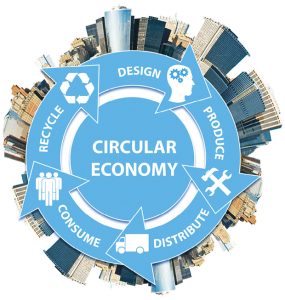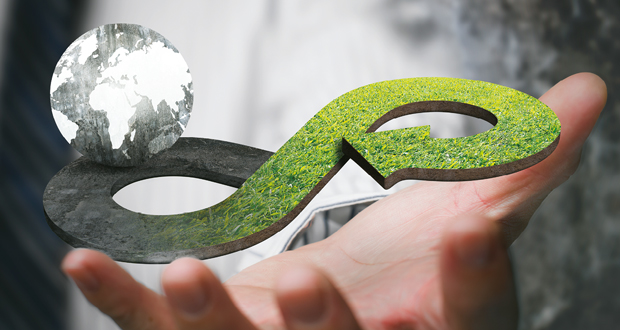With rising material costs, carbon reporting and increasing recognition by customers and organisations, the circular economy is gaining credence. Sunil Shah, Director and Heather Turner, Sustainability Analyst at Acclaro on what this could mean for the FM sector
The concept of the circular economy, one where materials are neither generated from virgin materials or disposed, has been around for many years, but has recently been identified as one of the biggest economic growth opportunities. In September 2015, McKinsey & Company identified in ‘Europe’s Circular-economy opportunity’ report that its net economic benefit in Europe alone will be €1.8 trillion by 2030.
Circular economy is a systematic approach focusing on minimising resource inputs and maximising the value at which materials are retained in the economy throughout an extended lifecycle. It aims for a global economic system that can thrive in the long-term by decoupling economic growth from resource use and environmental impacts. If achieved, it has the potential to make economies more resilient with more abundant resources and a healthier environment.
Policies such as the Resources and Waste Strategy (RWS) in England and the UK Government’s 25 Year Environment Plan, will likely dictate targets for private and public sectors to change their business models to incorporate the circular economy, with the aim of reducing waste, maintaining value and keeping goods in the loop.
Repair, reuse and recycling are essential components, but are often an afterthought in our conventional economic model. The circular economy approach begins by considering the need that is to be fulfilled and seeks the most resource-efficient way of doing so, beginning with the product design or business model development. In this way, procurement has a significant role to specify materials and services with a view to achieving a circular approach.
HOW DOES THE CIRCULAR ECONOMY APPLY TO FACILITIES?
FM has a role in the management of workplace waste streams, its interaction with staff and their behaviours, the lifecycle of projects, procuring and managing goods and services. To support the circular economy the FM sector will have to start looking at how goods and services are procured (one-off purchase vs. lease model), how they manage waste and assets in contracts, how they deal with end-of-life goods and what types of goods they are purchasing. Partnerships and collaboration with suppliers will spur new innovations that can renew and refurbish old materials.
Pinch points are already evident – for example there is a current crisis with the purchase of minerals and precious metals and how this relates to electronics. If FM companies can adopt the circular economy, supply chain squeezes such as this will be alleviated. There is a strong revenue stream available as well – waste office paper can be recycled for a rebate up to £300/t, and drinks cans for £1000/t.
 The benefits of the circular economy for FM need to be incorporated into business models from purchasing through to use and renewal. Here are some examples:
The benefits of the circular economy for FM need to be incorporated into business models from purchasing through to use and renewal. Here are some examples:
- Reduction in waste for FM which reduces their Scope 3 emissions and makes it easier to transition towards zero-carbon. Assets are no longer purchased for a contract and disposed of when the contract comes to an end.
- Reduced headline costs if goods required for a contract are leased rather than purchased.
- End of a contract will not mean the sale (or disposal) of assets at a loss (if leased or kept within the usage loop).
- Refurbishment of assets for use in other contracts brings down headline costs, extends the lifespan of said assets and increases the quality of service.
- Stronger supply chains for FM providers as they are no longer reliant on the high volume of purchases of key assets.
- Better relationships with suppliers as key sustainability metrics such as leasing models are integrated into purchasing contracts.
- Procurement teams will be upskilled and business models will become more sustainable, giving FM providers the edge during contract tendering phases.





